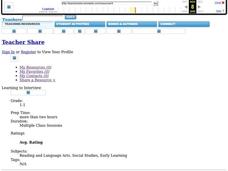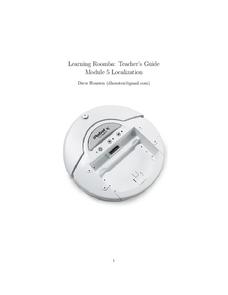Curated OER
Learning Clothes Vocabulary
Welcome to our fashion show! English language learners of any age will like this online, interactive website. This instructional activity focuses on clothing vocabulary, and there are several activities to reinforce the target...
Curated OER
Let's Learn About Plants!
Take your class on a nature walk around the school and have children assume the role of "Plant Hunter" as they go. The goal is to explore the different parts of a plant. They return to the classroom to discuss the parts that they saw and...
Curated OER
Explore Learning Exponential Functions
High schoolers graph exponential equations and solve application problems using exponential functions. They re-enact a story about a peasant worker whose payment for services is rice grains doubled on a checker board. They place M &...
Curated OER
Does My hair Disrupt Your Learning?
Students use the internet to research ways to save and earn money. They interview bankers and financial counselors to discover different types of investments. Students create public service announcements to inform their classmates of...
Curated OER
Learning to Interview
An authentic and engaging way to practice literacy skills, this lesson calls for young language arts pupils to conduct interviews with classmates and family members. First, pupils watch as the teacher models the interview process with a...
Curated OER
Learning Inference
Making inferences can be a tricky proposition for middle schoolers. In the lesson presented here, pupils practice the skill of drawing a conclusion and making a judgment - which are what making an inference is all about! There are five...
EngageNY
Learning About Farms in Colonial America: Explicit vs. Inferred Information
Aid your pupils in understanding the terms explicit and inferred while teaching them about colonial farmers. The third activity in the module builds off the previous activity and focuses heavily on inference. Learners analyze a...
Building Background Knowledge: Learning About the Historical and Geographical Setting of Esperanza Rising
Set up your class to read Esperanza Rising, by Pam Munoz Ryan, through a class read-aloud and exploration of the setting. The detailed lesson plan outlines each step. First, class members read over the first few pages and focus on the...
Pulitzer Center
Peacebuilding: Taking Home Lessons Learned in Africa
Learners take a closer look at one journalist's work on UN Peacebuilding efforts in four African nations: Sierra Leone, Burundi, Central African Republic, and Guinea Bissau. They collaborate to define peacebuilding and discuss...
Drexel University
Learning Roomba Module 1: Robotics Introduction
Introducing Mr. Robot. As an introduction to robotics, class develop a definition of a robot and make distinctions between real robots and those in science fiction. They also study the basics of programming in Java to...
Drexel University
Learning Roomba Module 2: Robot Configurations
How do robots move? A presentation shows viewers the different types of configurations of that help robots move and lists the advantages and disadvantages of each of the configurations.
Drexel University
Learning Roomba Module 3: Controlling Movement
Look at it go. The resource, the third in a series of five using a Roomba, explains the different types of movements a Roomba makes, then challenges pupils to create computer codes that will cause the Roomba to travel specific paths.
Drexel University
Learning Roomba Module 4: Sensors and Actuators
Introduce your classes to sensors and actuators in robots — specifically to the Roomba. Pupils develop programs that make Roomba utilize its different sensors.
Drexel University
Learning Roomba Module 5: Localization
Where is my robot? Pupils create programs that utilize the localization services that a Roomba uses to determine its surroundings.
Curated OER
Learning to Write and Send Email
Students generate more expressibe and receptive language by send emails to a friend. They improve their word processing and technology skills by sending and receiving emails. A rubric is included in this lesson plan for assessment purposes.
Media Smarts
Learning Gender Stereotypes
How do media representations influence our attitudes? Examining advertisements through the filter of gender representation forms the basis of this, the second of three lessons that address gender stereotypes. Resources include links,...
Perkins School for the Blind
Learning Names of Articles of Clothing
What to wear today; such a vexing question. Spend some time introducing the names, fabrics, types, colors, and functions of various articles of clothing to your class. Each child will take turns asking each other what they are wearing....
Curated OER
Pets: Oh Behave
Students develop an understanding of how innate and learned behaviors and the environment determine behavior. They see how a variety of factors affects our pet's behavior-including species-specific traits, the environment, training, and...
Curated OER
School Redesign and Multiple Intelligences
Students examine their own intelligence to find areas of strength after studying the multiple intelligences. For this diverse learning styles lesson, students analyze how the school environment fosters or fails students of diverse...
Curated OER
Veggie Chop and Data Analysis
First graders chop vegetables into fractions. In this fractions lesson, 1st graders cut vegetables, collect data about favorite vegetables and create a bar graph using the information. Students make inferences about the data and...
Curated OER
Journaling
Students identify, record, and process lessons completed through various service-learning activities. They create two-sided copies of the journal cover on colored paper and decorate so that it shows through both sides. Students then...
Curated OER
What Were Dinosaurs Like?
Students view a video clips about Dinosaurs. In this dinosaur lesson, students begin to understand the extinction of the dinosaurs by comparing them to contemporary animals. Students complete a research sheet on one dinosaur by...
Curated OER
Animal Behavior
Students investigate stimulus-response behavior, learned behavior in animals and innate behavior in animals. In this animal behavior lesson plan, students answer questions about their reactions to a toy cap gun that is fired off in...
Curated OER
The Human Knot
Young scholars practice cooperative learning skills by finding a solution to the group's "knot."
Other popular searches
- Project Based Learning
- Cooperative Learning
- Learning Disabilities
- Inquiry Based Learning
- Distance Learning
- Learning Styles
- Developmental Learning
- Discovery Learning
- +Developmental +Learning
- Learning 7 Continents
- Service Learning
- Learning Lesson Plans























